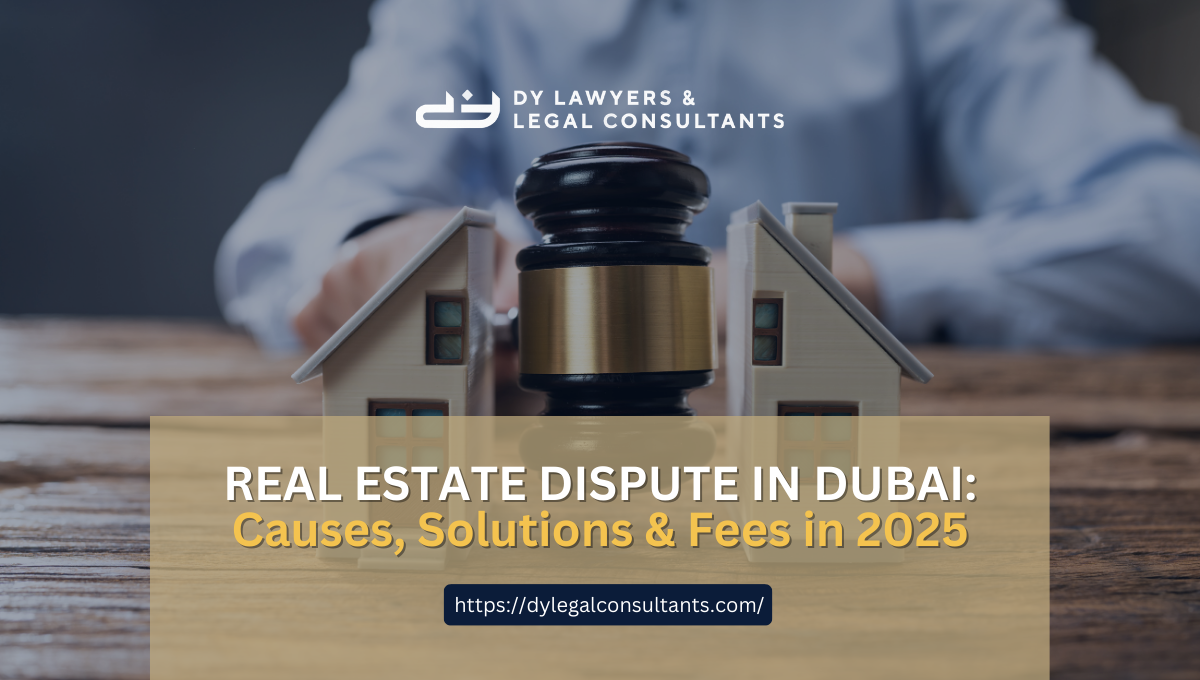Dubai’s property market is booming, but that means real estate dispute in Dubai can arise when parties clash over contracts, rent, or ownership. Common conflicts include landlord-tenant rent clashes, contract breaches by developers, or title claims among owners. The Dubai Land Department (DLD) and its Real Estate Regulatory Agency (RERA) provide a clear legal framework and formal dispute centers to handle these conflicts. This article explains the main types of disputes, the laws governing them, and step-by-step advice for resolving them.
Common Types of Disputes in Dubai
Disputes in Dubai’s real estate sector affect landlords, tenants, buyers, and developers. Some examples are:
|
Type of Dispute |
Common Issues |
|
Tenant, Landlord Disputes |
Unlawful rent increases, illegal evictions, and maintenance disputes. |
|
Property Ownership Disputes |
Title certificate challenges, inheritance disagreements, and boundary encroachments. |
|
Breach of Contract |
Incomplete or delayed projects, and developers failing to meet specifications. |
|
Developer–Buyer Disputes |
Off-plan delivery delays and quality defects in new properties. |
|
Construction Disputes |
Defective workmanship, contract disagreements with contractors. |
These categories overlap (for example, a delayed handover may involve both developer and construction disputes). In general, any breakdown in the tenancy contract, sale agreement, or construction agreement can trigger a real estate dispute in Dubai.
Also Read: What to Do if Your Landlord Refuses to Return Your Deposit
Legal Framework and Authorities
Dubai’s property market is governed by strict laws and regulators. All sales, leases, and transfers must be registered with the Dubai Land Department (DLD) – typically for a 4% transfer fee – to secure legal ownership. The Real Estate Regulatory Agency (RERA) (a DLD division) licenses brokers and enforces developer obligations. Key rules include mandatory escrow accounts for all off-plan projects, rules on rent increases and evictions (Tenancy Law), and full ownership rights for foreign buyers in designated freehold zones (Law 7/2006). In practice, this means buyers should verify titles and registrations carefully, and tenants rely on Ejari-registered contracts to protect their rights. Compliance with these regulations is enforced through real estate violation systems and courts, as detailed below.
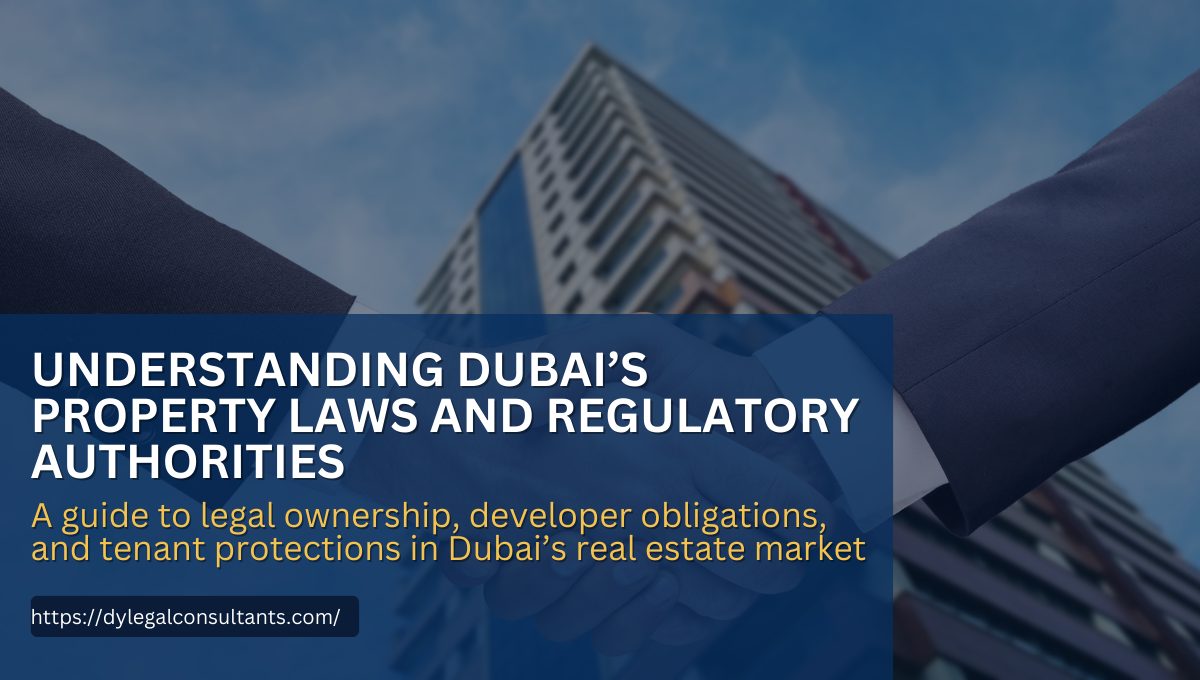
Resolving Real Estate Disputes in Dubai
When a real estate dispute in Dubai occurs, the first step is usually negotiation or mediation. Parties are strongly encouraged to discuss the issue directly and document their communications. Dubai’s DLD offers an online “amicable settlement” service where disputing parties can file for conciliation by a judge-approved mediator. If an agreement is reached, it becomes an enforceable settlement without full litigation. Mediation can save time and money while preserving relationships. If negotiations fail, formal procedures exist:
1) Rental Disputes (RDC)
For landlord-tenant issues, file a case at the Rental Dispute Centre (RDC) under DLD. Submit your tenancy contract, Ejari, IDs, rental receipts, and any evidence of the conflict. The RDC handles rent, eviction, and deposit disputes.
2) Commercial/Owner Disputes
File through DLD’s e-Services or directly in court. Complaints about title, breach of sale agreements, or other contract issues can be lodged at DLD or filed as lawsuits in UAE courts.
3) Case Hearings
Once filed, both sides present evidence and arguments. The Rental Dispute Centre typically issues a judgment in one hearing. For other property cases, courts may schedule multiple hearings and allow appeals.
4) Typical resolution steps:
a) Attempt Amicable Settlement
Approach the other party directly with your evidence. Many disputes can be solved by mutual agreement. In Dubai, emails or written notices from both sides help show an attempt at resolution. DLD’s “Dispute case (amicable)” service can also facilitate this in a formal way.
b) Gather Documents
Collect all relevant papers (contracts, title deeds, Ejari, payment proofs, notices, etc.) to support your case. For rental cases, this includes DEWA bills and any correspondence.
c) File with RDC/DLD
If no settlement, register a complaint. For rentals, apply at the RDC office or online (Dubai Land Department’s Rent Dispute Portal). For other disputes, submit documents to DLD or file suit in court. Fees must be paid (see Fees section).
d) Attend Proceedings
In the case hearing, both parties present their claims. For example, at the RDC, you give a memorandum to the judge with your evidence. The tribunal then issues a binding decision.
e) Appeal if Necessary
If you disagree with the initial judgment, you may file an appeal. For rental cases, appeals must be filed within 15 days of the First Instance judgment. However, the Appeal Department only considers cases where the annual rent or disputed amount exceeds AED 100,000, unless an eviction judgment or another exceptional circumstance applies.
5) Alternative methods
Some disputes (especially commercial property contracts) may use arbitration or litigation outside the DLD system. For example, DY Legal Consultants offers arbitration services for complex property cases, noting their team handles “property ownership, leasing and development disputes” through arbitration. Likewise, hiring an experienced real estate lawyer can help you navigate either court or arbitration paths. As DY Legal’s litigation team explains, a specialist lawyer “addresses issues of ownership, leases, construction, and more,” ensuring a fair outcome.

Also Read: Property Transfer Procedure in Dubai
Resolving Rental Disputes in Dubai
Rental (landlord-tenant) disputes have a dedicated process. In Dubai, most rental conflicts are handled through the Rent Dispute Center (RDC), under the Dubai Land Department. Common issues include illegal rent hikes, eviction without notice, maintenance neglect, and deposit disputes. Key steps for rental disputes:
1) Negotiation First
Always try to discuss the issue with your landlord/tenant. Email or write a formal notice explaining the problem. Often, parties reach an agreement without filing a case.
2) Prepare Documents
Gather your tenancy contract (registered with Ejari), IDs, Emirates ID, recent DEWA bills, deposit receipts, and copies of any written communication about the dispute.
3) File at the RDC
You (or your lawyer) submit a complaint at the RDC office or through the Dubai Land Department website. A typist at RDC will help formalize and translate your petition if needed.
4) Hearing & Judgment
Attend the scheduled hearing. Present your case with witnesses or documents. The RDC judge will consider evidence from both sides and issue a decision, often the same day.
5) Collect Awards
If you win, the judgment is enforceable as an executive deed. You should promptly collect any awarded rent or deposits.
If still unresolved, the RDC has multiple levels: an appellate committee and finally the UAE courts’ jurisdiction for very high-value cases. Throughout this process, you may hire a rental dispute lawyer. Specialists in this area can ensure your filings are correct and may negotiate on your behalf.
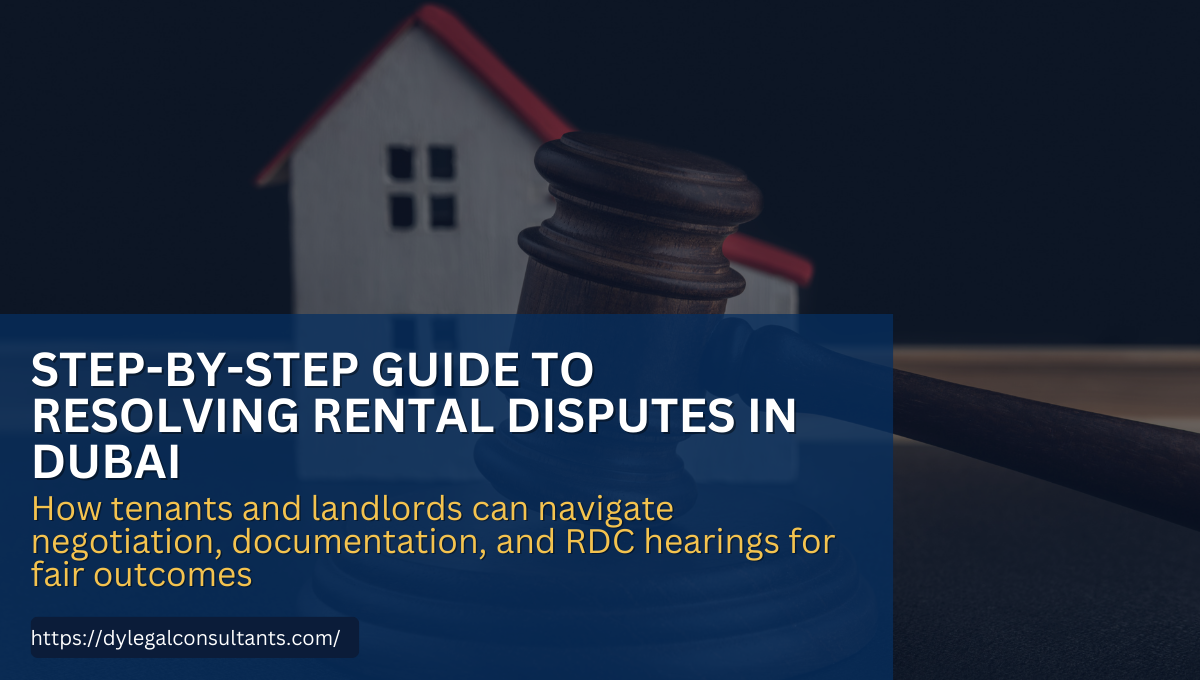
Dubai Real Estate Market Trends (2024-2025)
Dubai’s property sector has shown remarkable growth, which provides context for why disputes can be common. In 2024, Dubai recorded over 226,000 property transactions worth AED 761 billion. Sales volumes climbed by about 36% year-over-year. This strong market activity is due to sustained local and foreign demand: prices and rents have been rising across the city. Industry data reports that Dubai’s residential price index grew roughly 15.6% year-on-year in Q1 2025 (apartments +15.2%, villas +17.8%). Transaction statistics also remain high: 94,000 home sales were registered in H1 2025 (up +23% YoY) with a total value of AED 262.7 billion (+37%).
In summary, Dubai’s real estate market is booming. Strong economic growth, investor-friendly policies (e.g., Golden Visas for property owners), and a shortage of supply in prime areas have fueled this boom. As a result, there is intense competition for properties, and any contractual misstep can lead to disputes. However, experts remain optimistic: reports suggest a continued rise in luxury sales and a positive outlook for 2025. Buyers and tenants should be aware that rapid growth can bring changing rent indices (e.g., Dubai’s new “Smart Rental Index”) and dynamic price trends, reinforcing the need for legal guidance on contracts and tenant rights.

Also Read: Construction Contract Lawyers in Dubai
Real Estate Violation System (RVS) in Dubai
Real Estate Violation System (RVS) provides digital licensing, permit issuance, and broker e-cards, and integrates with property listing platforms to validate broker credentials. However, there is no official confirmation that RVS automatically verifies all listings or handles contract review services. Key features include:
1) Streamlined Complaints
The system provides a single portal to lodge a real estate complaint. Details and supporting documents are submitted online, and DLD authorities follow up on breaches.
2) Broker Licenses & E-Cards
RVS issues digital licenses and “e-cards” for brokers and real estate firms, confirming they are authorised to operate. Non-compliant agents can be flagged and fined.
3) Listing Verification
RVS is integrated with property portals to automatically screen listings. Only verified, RERA-approved ads can be posted. This helps prevent rental and sale scams.
4) Contract Inquiries
The platform can also assist parties with questions about their agreements. If your complaint involves an unfulfilled contract, RVS guides you on the next steps.
By using RVS, property owners and renters gain transparency and protection. For instance, tenants can quickly check if their broker is licensed or report a harassing agent via the system. Complaints filed through RVS are handled in compliance with DLD regulations. In short, RVS enforces Dubai’s real estate rules and offers a formal path for grievances outside the courts.
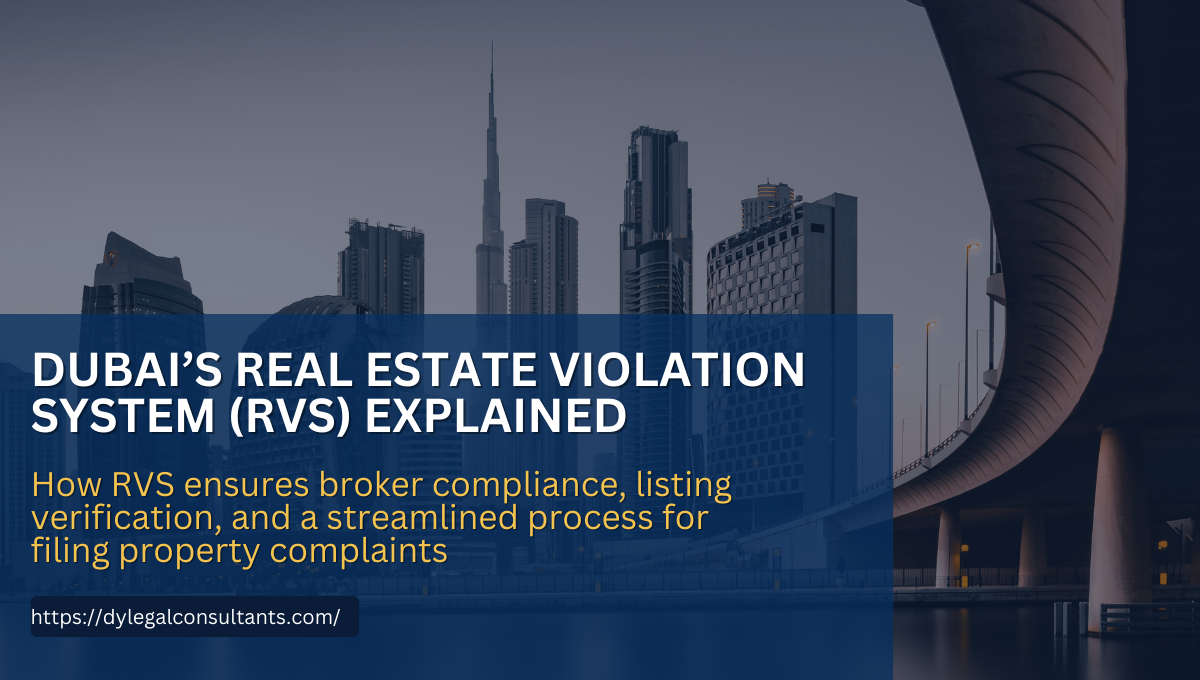
Rental Dispute Fees in Dubai
Filing a rental dispute with the RDC involves specific fees. The base filing fee is 3.5% of the annual rent (or lease value). In monetary terms, this means: minimum AED 500 and maximum AED 15,000 for financial claims. If your case involves eviction and financial claims, higher caps apply (up to AED 20,000 for an eviction case, and AED 35,000 for combined claims).
Additional fixed fees include:
- AED 25 for registering a power of attorney (if you use one).
- AED 100 for advertisement (official case announcement).
- AED 10 for a “knowledge fee” and AED 10 for an “innovation fee” on every case.
For example, if the annual rent is AED 100,000, the basic filing fee would be 3.5% of that (AED 3,500). Since this falls between AED 500 and AED 15,000, you would pay AED 3,500 as your dispute fee. These fees are paid online through the DLD portal or at a trustee’s office when submitting your RDC case. (If you file via a Real Estate Services Trustee Center, an additional AED 130+VAT service fee applies.)
Remember: if a mediated settlement resolves the case, half of the paid filing fee is refunded as per DLD policy. Otherwise, these fees are non-refundable. No fake or extra “hidden” fees are charged beyond the DLD schedule.
For tailored help, consider consulting experienced attorneys. Our Best Real Estate Lawyers in Dubai article outlines what top firms (including DY Legal Consultants) offer in terms of dispute resolution. We also provide mediation services to resolve disputes amicably, and litigation support if formal court or arbitration action is needed. For rental conflicts specifically, see our guide to rental dispute lawyers in Dubai.
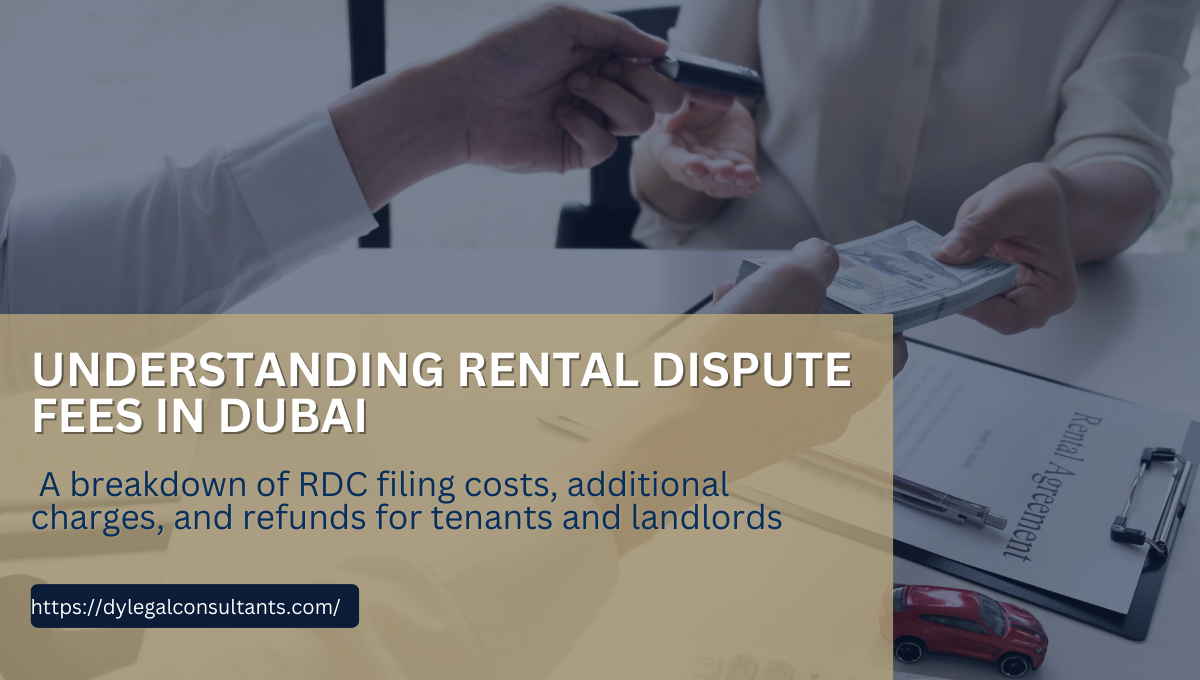
FAQs
How to resolve rental disputes in Dubai?
First, attempt an amicable settlement by communicating with the landlord/tenant, preserving evidence of your requests. If that fails, file a case at Dubai’s Rental Dispute Centre (RDC). Submit your tenancy contract, Ejari, ID copies, and any bills or receipts to the RDC (online or in-person). Attend the RDC hearing and present your case. If unhappy with the outcome, you can appeal to the RDC’s higher committee or escalate to civil court (depending on claim size). Consulting a rental dispute lawyer can help navigate these steps efficiently.
What is happening with Dubai real estate?
Dubai’s real estate market has been strong and growing. Recent reports show record transaction volumes and rising prices. For example, first-half 2025 saw ~94,000 sales (+23% year-on-year) worth AED 262.7 billion. Demand is fueled by a robust economy, foreign investment, and government initiatives (like 10-year Golden Visas for property owners). In short, Dubai’s market remains active, with luxury and housing segments both seeing sustained interest and price increases.
What is the real estate violation system in Dubai?
The Real Estate Violation System (RVS) is an online platform run by the Dubai Land Department. It lets anyone register complaints about real estate misconduct – for example, unlicensed brokers, fake property listings, or developer breaches. RVS also issues digital licenses and e-cards to verified brokers and automatically filters official listings on property websites. To use it, visit the DLD’s RVS portal, choose “Real Estate Violation,” and submit details of the violation with any evidence. This system helps ensure compliance and gives owners/tenants a clear way to report issues.
How much is the rental dispute fee in Dubai?
The filing fee at the RDC is 3.5% of the total annual rent. This fee has a minimum of AED 500 and a standard cap of AED 15,000 for financial claims. If you include an eviction claim, the cap is AED 20,000, and the combined eviction+financial claims cap at AED 35,000. Additionally, you pay small fixed charges: AED 10 each for the knowledge and innovation fees, AED 25 if you register a power of attorney, and AED 100 for advertising. For example, on a yearly rent of AED 100,000, the basic dispute fee would be 3.5% of that (AED 3,500).
Disclaimer: The content in this article is provided for informational purposes only and does not constitute legal advice.

